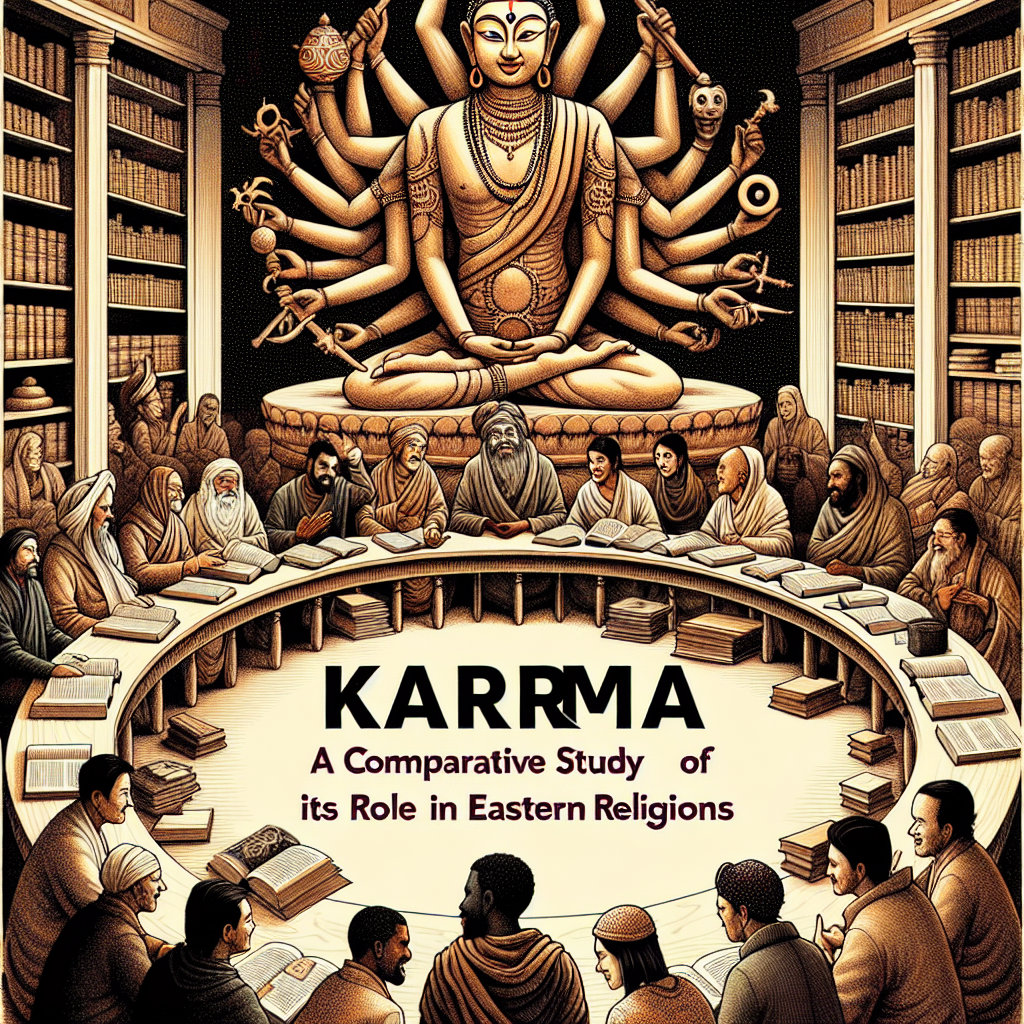Karma Across Cultures: A Comparative Study of Its Role in Eastern Religions
Karma, derived from the Sanskrit word "karman," meaning "action," is a concept that has transcended boundaries and is deeply embedded in various Eastern religions, including Hinduism, Buddhism, Jainism, and Sikhism. It is commonly understood as a moral law of cause and effect, where one’s actions in this life shape their experiences in future lives. This article delves into the multifaceted role of karma in these distinct yet interrelated traditions, exploring similarities and differences in their interpretations and implications.
Karma in Hinduism
In Hinduism, karma is not merely a philosophical doctrine but a fundamental belief that has influenced social and spiritual practices. It is intricately tied to the concepts of dharma (duty/righteousness) and samsara (the cycle of birth, death, and rebirth). According to Hindu beliefs, every action, whether positive or negative, creates karma that affects an individual’s future—both in subsequent births and in their current life.
Hindus believe in three types of karma: Sanchita Karma (the accumulated karma from past lives), Prarabdha Karma (the portion of karma that is ripe for experience in the current life), and Kriyamana Karma (the karma being created in the present). This triadic understanding allows for a nuanced approach to ethical living; individuals navigate their lives by aligning their actions with dharma, aiming for positive karmic outcomes.
Moreover, the concept of karma is tightly woven with the notions of caste and social order. Historically, one’s karma was thought to influence their place in society, with the caste system justifying social stratification based on past actions. However, contemporary interpretations of karma often emphasize personal responsibility and moral accountability, encouraging individuals to consciously contribute to their own and the collective good.
Karma in Buddhism
Buddhism inherits the concept of karma from Hinduism but reinterprets it through the lens of its unique teachings. In Buddhist philosophy, karma is central to understanding the cycle of samsara and the path toward enlightenment (Nirvana). The Buddha taught that karma is not merely a mechanical law of retribution but a dynamic force influenced by intention (cetana). Therefore, the quality of an action’s intention is of utmost importance when determining its karmic consequences.
Buddhism categorizes karma into three categories based on actions: wholesome (good karmic actions), unwholesome (bad karmic actions), and indifferent (actions that have no significant moral weight). The Eightfold Path in Buddhism serves as a guideline for skillful living, highlighting the importance of right intention and right action to create favorable karma.
A crucial aspect of Buddhist thought is the emphasis on the impermanence of life and the understanding that karmic consequences may not manifest immediately or in the same form as the original action. This belief encourages detachment from results and fosters a mindset centered on altruism and compassion.
Karma in Jainism
Jainism presents a distinct interpretation of karma that emphasizes its tangible and material aspects. Jains believe that karma is a physical substance that attaches to the soul as a result of one’s actions. This concept of karma is intertwined with the idea of purification of the soul through ascetic practices and ethical living. According to Jains, every action has a direct and measurable impact on the soul, influencing its progress toward liberation (moksha).
Jain teachings advocate for non-violence (ahimsa) and truthfulness (satya), which are paramount in preventing negative karma. The intricate rituals and observances in Jainism, including fasting and meditation, are understood as means to expunge accumulated karma. Unlike in Hinduism and Buddhism, where karma serves as a broader metaphysical principle, Jainism’s view is more intimate and personal—encouraging followers to seek liberation by purging their souls of karmic particles through self-discipline and ethical behavior.
Karma in Sikhism
Sikhism, founded in the 15th century, integrates the concept of karma with its teachings on divine grace and the importance of community. The Sikh perspective views karma as part of a divine order, where every action is observed by God, and individuals are accountable for their deeds. Sikhs also emphasize the importance of intentions behind actions, paralleling Buddhist thought. Engaging in selfless service (seva) and striving for justice are regarded as actions that generate positive karma.
However, Sikh theology differentiates itself by asserting the concept of hukam (divine order) and shabad (the divine word), suggesting that while individuals shape their destiny through karma, ultimate liberation comes through God’s grace rather than personal merit alone. This belief leads to a more community-oriented approach, encouraging adherents to focus on collective welfare and spiritual growth as a path toward transcending the karmic cycle.
Cross-Cultural Comparisons and Common Themes
While karma manifests differently across these religious traditions, some common themes emerge. The idea of moral causation lies at the heart of each interpretation, emphasizing that actions bear consequences affecting individuals and their surrounding environments. The importance assigned to intention is also a prevalent theme, differentiating mere actions from the moral weight they carry.
However, significant variations exist in how karma influences social structures, spiritual practices, and the broader metaphysical framework. Hinduism and Jainism focus heavily on individual action and its implications for the soul, while Buddhism encourages a more holistic form of understanding that emphasizes impermanence and compassion. Sikhism introduces a communal aspect, reflecting a synthesis of individual and collective responsibility.
Conclusion
Karma is a complex, deeply ingrained concept across Eastern religions, serving as both a moral compass and a philosophical inquiry into the nature of existence. While the interpretations vary, the underlying principle of ethical accountability resonates universally, influencing individuals’ relationships with themselves, society, and the cosmos. Understanding these diverse perspectives enriches the dialogue between cultures, inviting deeper reflection on the nature of moral action and its implications in our lives.
FAQs
1. What is the basic definition of karma?
Karma refers to the principle of cause and effect in moral action, where one’s actions influence their future experiences, including future births and life circumstances.
2. How does karma differ between Hinduism and Buddhism?
While both traditions recognize karma as a moral law, Hinduism emphasizes the accumulated karma from past lives, whereas Buddhism focuses on intention and the impermanence of karmic consequences.
3. Can karma affect someone’s current life?
Yes, karma can influence an individual’s circumstances in the present life, as well as their experiences in future reincarnations.
4. Is karma fixed, or can it be changed?
Karma can be changed through conscious actions and intentions. Practicing good deeds results in positive karma, whereas harmful actions lead to negative karma.
5. What role does intention play in karma?
Intention is crucial in determining the karmic value of an action. Positive intentions lead to positive karma, while negative intentions contribute to negative karma, regardless of the act’s outward appearance.
It seems like your message was cut off. How can I assist you today? If you have a specific prompt or question in mind, please share it!, #Karma #Cultures #Comparative #Study #Role #Eastern #Religions, #Karma #Cultures #Comparative #Study #Role #Eastern #Religions, 1735088895, karma-across-cultures-a-comparative-study-of-its-role-in-eastern-religions





